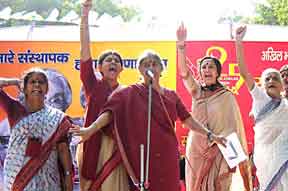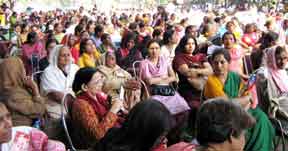 People's Democracy
People's Democracy
(Weekly
Organ of the Communist Party of India (Marxist)
No. 48
November 26, 2006
(Weekly
Organ of the Communist Party of India (Marxist)
|
Vol.
XXX
No. 48 November 26, 2006 |
CELEBRATING 25 YEARS OF AIDWA
“We Will Strengthen The Struggle And March Forward”

(From right) Ahilya Rangnekar, Brinda Karat, Subhashini Ali, Sudha Sundararaman and Ashalata on the dais
Sudha Sundararaman
AN inspiring celebration of its Rajat Jayanti year was held by AIDWA in Delhi on November 21, 2006. Parliament street was witness to a huge gathering of AIDWA women from the many states of India, who congregated joyously in front of the Suseela Gopalan Manch at the Rajat Jayanthi Samaroh. Many had arrived straight from their state jathas, because the event also concluded the AIDWA all India jatha for social reform launched on November 7, which received tremendous response from women everywhere. The stage was set amidst AIDWA festoons, and colourful banners depicting multi-dimensional struggles over the years in graphic fashion, with a huge picture of AIDWA’s founding leaders providing an inspirational backdrop.
The meeting began with a play by the Haryana AIDWA team titled “Let them Live” highlighting the issue of caste panchayats and honour killings that are denying couples the right to choose their partner or to go in for intercaste marriages. The play also depicted how AIDWA has been successful in preventing murders in areas where it had presence, and called for a powerful campaign against such injustice.
The president, Subhashini Ali began the proceedings with a condolence resolution for our martyrs, and also for those killed in recent acts of violence – the murder of four dalits in Khairlanji, of whom the mother and daughter were also brutally gang raped, the death of Parameshwari in the ongoing struggle for water in Rajasthan, and those who had died in the train bomb blast in Jalpaiguri.
She also moved the resolution for immediate passage of the 33 per cent Women’s Reservation Bill, demanding that the UPA government should retain the original Draft Bill prepared 10 years ago, place it for open discussion in the winter session of parliament starting the next day, and ensure that it is passed.
As one of the indomitable founding leaders of AIDWA, Ahilya Ranganekar came up on stage, along with Brinda Karat, and other AIDWA office bearers, they were greeted with slogans and cheers from the audience. Ahilya released a copy of the AIDWA song cassette – “Come , Let us sing” containing songs questioning and challenging the existing status quo. This was a first time achievement for AIDWA, and the cassette was received by the general secretary, Sudha Sundararaman, along with a copy of the Rajat Jayanthi special edition of Samya – AIDWA’s Hindi publication.
BRAVE FIGHTERS OF AIDWA

A section of the gathering at the Parliament Street
AIDWA activists and leaders from states who had faced repression and bravely fought back narrated their experiences to the meeting.
Bijoylakshmi Sinha, a minister from Tripura, whose husband was brutally murdered by terrorists, and Dayarung Roaja, a tribal activist who lost her family in a similar way described the heroic way in which AIDWA members are combating terrorism in the state.
Durga Swamy, general secretary of AIDWA, Rajasthan, who came up limping as she had not yet recovered from the brutal police lathicharge in which she too had suffered grievous hurt, described the Sriganganagar struggle for water, the repression let loose by the BJP state government and the ongoing joint resistance by all sections of people, including AIDWA.
Baby from Kerala, elected thrice to the Kasargod panchayat, recounted the experiences of women in panchayats, and the strides being taken by Kerala women in asserting their role. She highlighted successful interventions against liquor liberalisation, and for water availability – both immediate concerns of women.
Razia from Gujarat gave a hard-hitting account of how the Modi government continued to discriminate against Muslims, how they have not yet got their paltry compensation, and how the Gujarat riots had had the worst impact on poorer women whose livelihood was totally destroyed. She gave an inspiring report of the attempts that the AIDWA local units were making to bridge the gap between communities, and to afford respite to women in need through active self help groups with participation from members of different communities.
Veena Arora, the general secretary of the BIS Employees Federation shared the trauma she underwent due to sexual harassment in the office, and how things changed dramatically after she joined up with AIDWA and launched a protest against the perpetrators.
Tai Bender from Maharashtra, a young adivasi from the district of Thane described the miserable plight of adivasis who are facing a crisis in employment, how there is a perennial fight for ration, kerosene etc. through PDS, as the government refuses to provide the smallest relief, leave alone ensuring food security.
Susai Mary, an AIDWA activist from Tamil Nadu who could not travel because of an injury to her arm caused by a murderous backlash to her fight for justice on behalf of a dowry victim sent a message of greetings.
The rally was then addressed by AIDWA vice president Brinda Karat, (MP). She spoke about the direction of the movement over the 25 years and the approach of AIDWA to gender oppression. AIDWA is against patriarchy and male domination, it is not against men. Equality for women has to be ensured in all aspects of society, including within the institution of the family, she said. She also reiterated AIDWA’s understanding of how women’s labour is exploited, how economic policies are impoverishing her, and the importance of voicing the concerns of the marginalised and oppressed sections. She spoke about the horrendous attack on a dalit family in Khairlanji, and underlined the need to take up issues of caste and communal exploitation and discrimination. She concluded with a call to take on the UPA government and its policies, and ensure that it implements the CMP in toto.
The meeting was greeted by friends from other women’s organisations like Joint Women’s Programme, YWCA, etc. and leaders from fraternal organizations – N K Shukla of the AIKS, Suneet Chopra of the AIAWU, Hemalata of the CITU, and SFI, DYFI comrades.
Other than the resolution on 33 per cent women’s reservation, four important resolutions were passed. Resolution against atrocities on dalits and the continuing discrimination in all spheres was placed by Kalindi Deshpande and seconded by Madhu Garg; the resolution on the rights of Muslim women was placed by Kirti Singh and supported by Mariam Dhawale; the resolution on employment guarantee, strengthening of PDS and against price rise was placed by Kiran Moghe and supported by Jyoti; and the resolution against violence on women demanding proper implementation of the Domestic Violence Act, and the PNDT Act was placed by Sumitra Chopra, and seconded by Surinder Kaur.
Sudha Sundararaman gave the concluding speech pointing out the need to safeguard our rights as enshrined in the Constitution, which had been won through struggle. She drew on the traditions of multi-dimensional struggles as exemplified by leaders like Ahilya Ranganekar. The direction of development – with the State backing out of its responsibilities on education and health, and coming forward to sell vital natural resources like water – has to be fought, she said.
The social reform agenda continues to be a crucial one as many forms of social discrimination that deny women equal rights are still widely prevalent, even while women are resisting and claiming the spaces. This trend of fundamentalism, and the newer challenges being posed by commodification in a globalised world that is leading to greater poverty, greater violence, has to be tackled. She gave a call for organisational expansion to all nooks and corners of the country so that the fight against injustice can become even more widespread.
The meeting ended with a vote of thanks by Ashalata, an inspiring song and dance by the Assam activists, and slogans from all our women voicing their determination to carry the struggle forward.